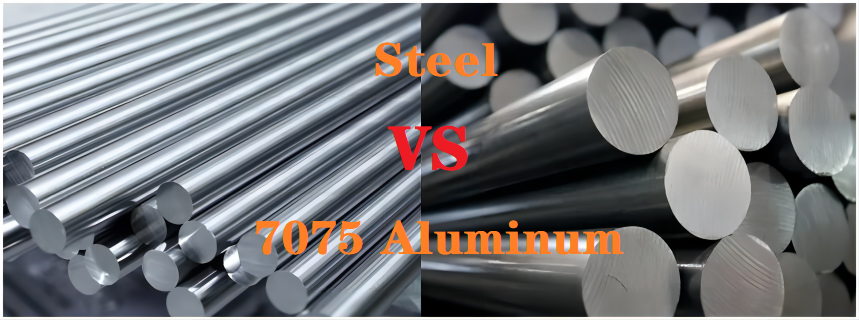7075 Aluminum VS Steel:Which is Better
 Aug 24,2023
Aug 24,2023

Aluminum alloy AA 7075 and steels belong to entirely different classes of materials. Their superiority depends upon their application. AA 7075 is the strongest alloy among 7xxx series and have very high strength to weight ratio. This property makes it a special alloy for multiple applications and raise the question of compression with steels. Steels, on the other hand, have various sub-classes i.e. plain carbon steels, low alloy steels, stainless steels, tool steels and ultra-high strength steels which are designed for particular applications.
In this article, you will find a detailed technical comparison of both type of materials based on their properties, applications and fabrication.

AA 7075 Alloy
AA 7075 is an alloy of Zinc in Aluminum. Other important alloying elements of chemical composition of AA 7075 include magnesium, copper and chromium. AA 7075 is strongest in T6 condition. Required mechanical properties are achieved using specific heat treatment process. Generally, the alloy is solution treated at about 460 ˚C followed by water quenching. After achieving super saturated solid solution of AA 7075, it is artificially aged at 120-160 ˚C for several hours based of the size and thickness of the part. This condition of AA 7076 is called T-6 condition which is mostly used in aerospace, automotive and structural applications.
7075 Aluminum Density
Density is a fundamental property of any material and refers to the amount of mass packed within a given volume. It is typically measured in grams per cubic centimeter (g/cm3) or pounds per cubic inch (lb/in3). In the case of 7075 aluminum, its density is 2.81 g/cm3 (0.102 lb/in3).
How strong is 7075 aluminum
7075 aluminum is known for its exceptional strength and is regarded as one of the strongest aluminum alloys available. It has a high tensile strength and yield strength, which are measures of the material's ability to withstand pulling forces and resist deformation, respectively.
The tensile strength of 7075 aluminum is typically around 572 MPa (83,000 psi), which is significantly higher than many other aluminum alloys. This makes it suitable for applications where high strength-to-weight ratio is crucial, such as in aerospace, defense, and structural components.
The yield strength of 7075 aluminum is approximately 503 MPa (73,000 psi). Yield strength refers to the point at which a material begins to exhibit permanent deformation or "yield" under applied stress. With a high yield strength, 7075 aluminum demonstrates its ability to resist deformation and maintain its structural integrity even under significant loads.
It is important to note that the strength of 7075 aluminum can vary depending on factors such as the specific temper, heat treatment, and manufacturing processes used. Manufacturers can further enhance the strength of the alloy through heat treatments such as precipitation hardening.
7075 aluminum is known for its exceptional strength, making it a preferred choice in applications where lightweight, yet strong materials are required.
Different Types of Steel
Steel is a class of material in which properties of pure iron are improved using various type of alloying elements. Major classes of steels involve:
- Plain carbon steels e.g. 1045
- High strength low alloy steels e.g. 4340
- Stainless steels e.g., SS 420, SS321, 17-7 Ph etc.
- Tool steels e.g., D2, H13, K-105 etc.
- Ultra high strength steels e.g., Maraging 400
Each class of steel has its own characteristic applications based on their properties. Steel usually have very high strength and hardness as compared to AA 7075. However, low strength to weight ration than AA7075 limit their use in particular application, especially where weight is prime concern for designers.
Chart of the Differences Between 7075 Aluminum and Steel
Steels and AA 7075 have remarkable differences based on their chemical composition, mechanical properties and physical properties.
|
Material |
Base Metal |
Magnetic |
Working temperature |
Strength To weight ratio |
Drawability |
|
AA 7075 |
Aluminum |
No |
Less than 100 ˚C |
High |
High |
|
Steels |
Iron |
Yes (except few Stainless Steels) |
Up to 500 ˚C |
Low |
Relatively low |
AA 7075 has FCC crystal structure and can be drawn in several shapes with an ease as compared to steel. Though, corrosion resistance of AA 7075 inferior to many other aluminum alloys but far better than many steels except few stainless steels.
7075 Aluminum and Steel Chemical Properties
Chemical properties of AA 7075 and steels depends upon their chemical constituents. AA 7075 form a protective film over its surface which stops further oxidation. On the other hand e.g. plain carbon steel and tool steels, are prone to excessive oxidation as they form a loose oxide layer over their surfaces which don’t protect further oxidation. As far as, stainless steels are concerned e.g. SS 321, SS 316L, they are more chemically stable than AA 7075 as they form strong protective layer of oxide to restrict further oxidation.
7075 Aluminum and Steel Physical Properties Chart
There are appreciable differences in physical properties of both material types. The most prominent properties are given in below table:
|
Material |
Melting Point |
Density (g/cm3) |
Electrical conductivity |
Thermal Conductivity |
Crystal structure |
|
7075 Aluminum alloy |
~ 640 ˚C |
2.81 |
High |
High |
FCC |
|
Steel |
~1550 ˚C |
7.8 |
Relatively Lower than steels |
Relatively Lower than steels |
FCC & BCC based on steel grade |
High strength-to-weight ratio
AA 7075 has high strength to weight ratio than steels. This property make AA 7075 a prominent competitor of steels in application where weight reduction is inevitable e.g., aerospace applications. The strength to weight ration of AA 7075 solely depends upon its heat treatment condition. In all such applications, T6 temper condition is used. On the other hand, steels have inferior strength to weight ration due to their high density. The unit of this property is N/m3.
Is 7075 aluminum stronger than steel
The answer is “No”. Though AA 7075 is strongest in aluminum family but usually steels are far stronger than AA 7075 e.g., AISI 1045, SS 420, SS316, 17-7Ph, Maraging steel, SAE 4140, SAE 4340 etc. However, there are very few steel grades, whose tensile strength in annealed condition is comparable with AA 7075 e.g. AISI 1015, AISI 1020 etc. But as a rule it can be stated that steels are stronger than AA 7075.
Corrosion resistance
Aluminum alloys are popular because of their exceptionally high corrosion resistance. However, in case of AA 7075, presence of copper make it less corrosion resistance than other alloys of its family. It causes inter-granular corrosion. Sometimes protective coatings are applied in AA 7075 to protect it from corrosive environment.
Steels except stainless steels, are highly corrosive in nature. They form a porous layer of oxide over their surface which degrade with time and cause further corrosion. They cannot be used in field without corrosion protection.
Resistance to deformation
AA 7075 is easily drawable and can be formed in several shapes. Usually, the shaping process of this grade is carried out in solution treatment condition (O-condition). Once the final shape is achieved, aging is performed to achieve superior mechanical properties. AA 7075 alloy’s tendency to deformation is superior to steels.
7075 Aluminum vs Steel: Mechanical Properties
Mechanical properties of AA 7075 and steels are remarkably different and found different set of application. AA 7075 is used in aerospace application where high strength is required in addition to light weight e.g. in fabrication of fuselages, wings, helicopter rotor blades etc.
|
Alloys |
UTS (MPa) |
Yield Strength (MPa) |
Percentage Elongation |
Hardness (HB) |
|
AA 7075* |
~ 550 |
~ 480 |
~ 10 |
160 |
|
Steel |
500-2200 |
450-1500 |
2-25 |
150-750 |
*Properties are in T6 condition
The mechanical properties of steels are solely depends upon the grade of steel. The broad ranges of mechanical properties mentioned in the table covers all grades of steel from AISI 1010 to Ultrahigh strength steels.
Weldability
7075 aluminum weldability is not too good as compared to other grades of its family. Usually, it is welded in O-condition because it will lose its strength in the weld region when welded in aged condition. Usually welding rods having low copper content are preferred for its welding. On the other hand, steels having less percentage of carbon have far better weldability than AA 7075, while steels having high strength and higher percentage of carbon have inferior weldability than AA 7075.
Machinability
AA 7075 has moderately good machinability as compared to high strength steels. However, its machinability is more challenging when compared with other aluminum alloys.
Which is 7075 Aluminum and Steel More Expensive
As far as simple grades of steels e.g. AISI 1030, AISI 1045 or SAE 8620 are concerned, AA 7075 is more expensive than these steels. However, several high strength grades of steel which require special refining techniques e.g. stainless steels, 17-7 Ph, maraging steels are far more expensive than AA 7075.
When to Use 7075 Aluminum or Steel Fitting
It is entirely depends upon application. AA 7075 steel fittings are usually used where moderate strength, light weight, better corrosion resistance, good weldability and non-magnetic properties are essential. Contrarily, steels fitting are usually less expensive, have high strength, high weight, magnetic and relatively poor corrosion resistance.
Why Choose Tuofa for Custom 7075 Aluminum and Stainless Steel Parts
Tuofa has specialization in manufacturing of high purity aluminum alloy AA 7075 with precise control in product geometry. Stainless less pasts of various grads are also available of customized requirements. Our expert’s consultancy will be beneficial to our clients at many level regarding finance and time saving.
FAQs
7075 T6 aluminum vs steel
AA 7075 has exceptionally high strength to weight ratio as compared to steels. However, steels are usually stronger alloys than AA 7075.
Which is stronger aluminum or steel?
Usually steel is stronger than AA 7075 steel. However, strength of few grades of steel e.g. AISI 1010, AISI 1015 etc. are comparable with AA 7075.
Steel vs Aluminum Hardness
When comparing steel and aluminum, steel is generally considered to be harder than aluminum. Hardness refers to the ability of a material to resist deformation, indentation, or scratching. Steel, being an alloy consisting primarily of iron with various added elements, including carbon, is known for its hardness.
The hardness of steel can vary depending on the specific grade and the heat treatment it has undergone. High-carbon steels, such as tool steels, can achieve high levels of hardness, making them suitable for applications requiring wear resistance. However, hardness often comes at the expense of reduced ductility.
On the other hand, aluminum, including alloys like 7075 aluminum, is generally softer than steel. Aluminum has a lower hardness due to its atomic structure and the presence of softer elements like magnesium or silicon in certain alloys. While aluminum is not as hard as steel, it compensates for this with other advantageous properties, such as its low density, high ductility, and excellent corrosion resistance.
In summary, steel is typically harder than aluminum, but the choice between the two materials should be based on the specific needs and requirements of the intended application.
 Tel/WeChat:
Tel/WeChat:  Email:
Email: 
 Home
Home
 How to Sandblast Metal | Complete Guide
How to Sandblast Metal | Complete Guide 







